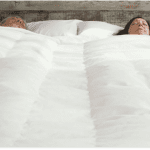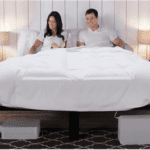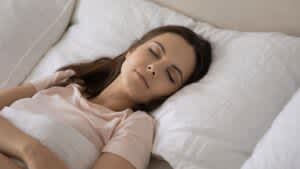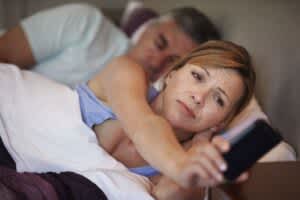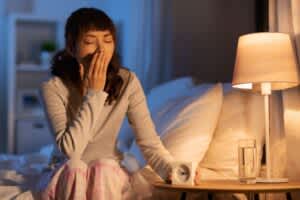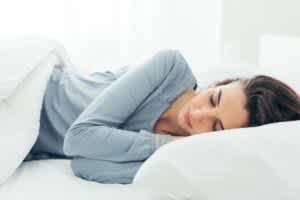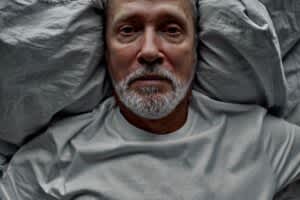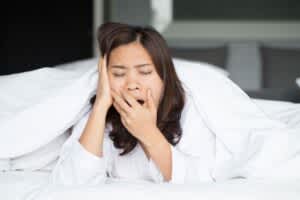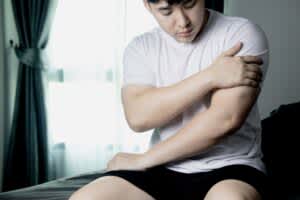Sometimes after a night of sleep or even a power nap, people find themselves waking up with drool on their face, pillow, or clothes. While the event may be embarrassing, drooling while sleeping is a common and normal occurrence.
Drooling occurs when excess saliva spills out of the mouth. Our bodies produce saliva for a number of reasons. While eating, saliva helps with collecting food in the mouth, activating taste, dissolving food, and preparing the food for digestion. Saliva also defends the mouth from bacteria and protects it from damage.
There are a few reasons for drooling in your sleep, including side sleeping and mouth breathing during sleep. Additionally, the swallow reflex occurs much less during sleep than during waking hours, which can lead to a buildup of saliva.
However, in some cases, drooling may be caused by difficulty swallowing or by saliva overproduction, which may indicate underlying health conditions.
Excessive drooling can also contribute to bad breath, chapped lips, and dehydration. People experiencing these symptoms should discuss management options with a health care provider.
Sleep Position
The most common cause of drooling during sleep is your sleep position. While side sleeping is the predominant sleep position for adults, it can make it easier for saliva to escape the mouth. In contrast, gravity helps back sleepers from drooling during sleep.
Mouth Breathing and Bruxism
Sleepers who breathe through their mouth rather than their nose may also experience drooling. An open mouth in a side or stomach sleeping position allows saliva to exit. Mouth breathing during sleep is also associated with snoring, sleep apnea, restless sleep, and bruxism.
Bruxism, or teeth grinding, involves the jaw moving forward and mouth opening to allow for airflow during sleep. As a result, sleepers with bruxism often breathe through their mouths and can potentially drool while sleeping. Bruxism can also lead to headaches and wear down teeth.
Allergy Symptoms and Infections
Allergies and infections such as strep throat or the common cold typically have symptoms of a sore throat, stuffy nose, and sinus congestion. These symptoms can lead to nasal obstruction, forcing one to breathe through their mouth, which can then result in drooling during sleep.
GERD
Gastroesophageal reflux disease, or GERD, occurs when a muscle in the esophagus doesn’t work as it should, allowing bile, acid, and other stomach contents to leak into the esophagus. This leads to irritation and inflammation.
GERD can cause difficulty when swallowing, also called dysphagia. The acid in the esophagus from GERD can increase saliva production and result in nighttime drooling. Other symptoms of GERD include heartburn, sore throat, and cough. People who experience GERD symptoms should consult with their doctor for diagnosis and treatment.
Sleep Apnea
People with sleep apnea temporarily stop breathing while they sleep because airflow into the nose, mouth, or both is reduced. As a result, a common symptom of sleep apnea is mouth breathing during sleep, which can then lead to drooling.
Talk with a doctor if you have other symptoms of sleep apnea, such as:
- Snoring
- Choking or gasping during sleep
- Restless sleep
- Waking with dry mouth or sore throat
- Excessive daytime sleepiness
- Headache
- Difficulty concentrating
Medications
Excessive salivation is a side effect of certain types of drugs. For example, people who take medication to treat Alzheimer’s disease and the neurological disease myasthenia gravis commonly experience drooling.
Other types of drugs that may increase saliva production and lead to drooling during sleep include:
- Antipsychotics
- Benzodiazepines
- Anticonvulsants
- Certain antibiotics
Medical Conditions
Drooling is a symptom of a number of conditions that affect the nervous system and the brain. Some of these conditions affect the control of facial and oral muscles. Other conditions increase the amount of saliva the body produces.
Medical conditions that cause drooling include:
- Amyotrophic lateral sclerosis (ALS)
- Autism
- Bell’s palsy
- Cerebral palsy
- Multiple sclerosis
- Parkinson’s disease
- Stroke
How to Control Drooling in Your Sleep
In most cases, drooling during sleep is a normal occurrence and does not require intervention. However, people who want to stop drooling during sleep may need to experiment with approaches to determine which combinations are right for them.
A doctor, therapist, or other professional can offer guidance on drooling management. Be sure to consult with a health care professional to determine if an underlying health condition could be the cause of excessive drooling.
Changing Your Sleep Position
The simplest step to managing nighttime drooling is changing your sleep position. Sleeping on your back, rather than on your stomach or side, decreases the amount of saliva that flows out of your mouth.
It may be easy to switch to a new sleep position, or you might need to make some changes to feel comfortable sleeping on your back. Proper spinal alignment is important for back sleepers. Adding a pillow under your knees can prevent the lower back from sinking too deeply into the mattress.
Additionally, the pillow under your head should keep your neck and shoulders aligned with your spine. You could transition to new pillows and mattresses that are designed to support back sleeping.
Controlling Allergies
A number of allergic symptoms, such as nasal and sinus congestion, can impact saliva production and therefore drooling while sleeping. To reduce drooling caused by allergies, the allergy triggers should be addressed.
When possible, avoid allergens that cause congestion, such as pollen, dust, and mold. Over-the-counter and prescription antihistamines, corticosteroids, and decongestants can be used to reduce symptoms. In some allergy cases that are hard to manage with medicine alone, a health care provider may recommend allergy shots. Consultation with a medical professional can help determine which approach is appropriate for you.
Speech Therapy
Speech therapy refers to rehabilitation that helps improve communication skills. The speech therapist evaluates and diagnoses communication challenges and develops a plan for addressing those needs. A speech therapist can also assist patients with swallowing disorders.
A number of strategies to reduce drooling can be learned and practiced in speech therapy. For example, some exercises focus on building muscle control in the lips, mouth, and tongue. Other exercises can focus on training the lips to stay together and closing the mouth. Swallowing rehabilitation, such as training to swallow forcefully, can also be conducted in speech therapy.
Medical Interventions
Medical interventions for drooling are typically reserved for children and adults who drool during the daytime or at night due to an underlying health condition. The appropriate treatment largely depends on the cause of the drooling and the patient’s experiences. Discussion with medical professionals is crucial before moving forward with a medical intervention to address drooling.
- Botox injections: Botox is a drug used to obstruct nerves or weaken muscles in a targeted area. To treat excessive drooling, botox is injected into the salivary glands. Although the treatment has few side effects, its effects typically only last for about three to four months.
- Medications: Drooling can be managed with a class of drugs called anticholinergic agents. These drugs can be taken orally, under the tongue, or in the form of a patch.
- Surgery: Surgery is a more invasive option to drooling and may involve tying, rerouting, or removing the salivary glands. Typically, surgery is reserved for more severe cases or when other treatments have not been effective.
- Radiation therapy: In this rare treatment for excess saliva, high beams of energy target salivary glands. Experts recommend radiation therapy as an alternative for elderly adults who cannot have surgery. The approach is not recommended for children because it can lead to delayed growth and other health conditions.
References
The Sleep Doctor Forum: Real Experiences, Real Connections
Continue the discussion on the Sleep Doctor Forum. Connect with experts and fellow forum members on CPAP, sleep apnea, and all things sleep. A priceless resource that’s free to join.













